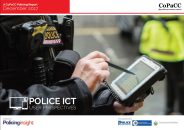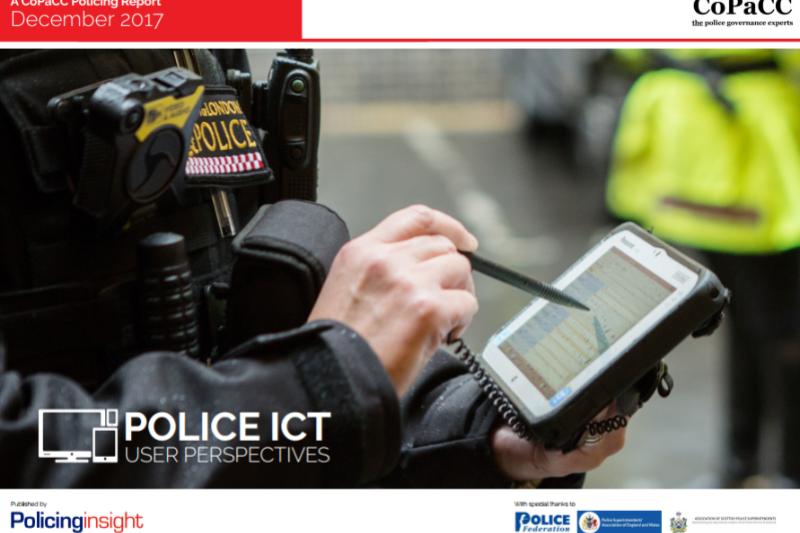It is clear from the results of CoPaCC’s first annual Police ICT User Survey that ICT is the bane of many officers’ lives. Rather than an invisible friend offering vital support, it is often highly intrusive and, in some cases, downright obstructive. Despite this, CEO Bernard Rix says the service and suppliers need to embrace the survey’s results which, as it happens, are not all bad and use them to drive change.
The 2017 survey had nearly 1500 respondents who answered ten questions spanning their experience of their force’s ICT provision as well offering, between them, an additional 5500 comments. In June 2018, this year’s iteration of the annual survey is aiming to capture the views of over 10,000 officers within the service.
“The national survey is a remarkable look behind the curtain of police ICT and, for the first time, we can quantify issues my members have been raising with me for a very long time. For the first time, you [suppliers] are able to get your information straight from the horse’s mouth.”
Sgt Simon Kempton, Digital Policing Lead for the Police Federation of England and Wales
Speaking to police ICT suppliers at a briefing hosted by techUK, Mr Rix said that rather than view the survey as the grumblings of malcontents, it should be seen as a genuine opportunity for police and suppliers to work together. He said the survey provided vital information, including some early potential ‘wins’.
“It’s providing insight on where the quick wins lie. The responses in the survey highlight action that can be taken now such as fixing printers that are broken, fixing terminals and, although slightly more challenging, making sure there is sufficient bandwith to run the systems they’re being asked to run.”
Mr Rix highlighted another frustration vented by users: IT helpdesks. “Helpdesks tend to be staffed 9-5, five days a week. If you’re a custody sergeant needing help at 11pm on a Saturday night and you have to wait until Monday morning, you’re likely to think badly of your ICT department.”
Mr Rix said that at this year’s Police ICT annual summit there were discussions around systems that would take two to three years to develop, but he added that time ‘needed to also be devoted to ICT users of today’.
He said that the users’ survey also provided leverage both to the staff associations that have supported it, but also suppliers in taking on board what officers have fed back.
“The survey provides associations with information that has been independently collected, collated and analysed which will allow people in any force to have a constructive conversation around the findings and their implications with their chief of PCC.”
“But it is also leverage for suppliers. There are instances where police officers have been uncharitable about you [suppliers]. There are some good things too and I believe the information, good or bad, in the survey will enable you to better understand the issues facing users.”
Mr Rix added that the survey was an opportunity to ‘establish solid lines of communication so we can use this positively and together we can affect positive change. We all want to make sure we deliver on this’.
Sgt Simon Kempton of the Police Federation of England and Wales who facilitated the survey by distributing questionnaires among its membership said the survey finally gave a voice to police ICT users.
“We haven’t got across the importance of technology and the link to community safety. With better technology, our communities could safer. There would be less road deaths, less anti-social behaviour, less domestic abuse. That hasn’t yet got across. It has in counter-terror, but not in every day policing.”
Government Adviser on Policing and Criminal Justice Lord Wasserman
“The national survey is a remarkable look behind the curtain of police ICT and, for the first time, we can quantify issues my members have been raising with me for a very long time. For the first time, you [suppliers] are able to get your information straight from the horse’s mouth.”
Sgt Kempton, who is PFEW Deputy Treasurer and Digital Policing Lead, stressed that the value of the survey lay in the positive feedback as much as the negative.
“By highlighting good practice, it allows us to learn from each other. It is by doing this, listening to the men and women using these systems, that we can improve the provision of the service.
“I’m hoping this will allow the tech industry to focus on what’s needed by frontline officers as they go about their duties.”
Sgt Kempton echoed Mr Rix’s comments that there were quick wins to be had.
“We need to make sure there is adequate hardware for officers so they’re not queuing up waiting for terminals when they could be out on the street locking up criminals.
“We need to invest in infra-structure, especially in more rural areas. We’ve seen investment in high-end hardware only to see it rendered useless because of issues with connectivity and bandwith.”
“But there is good news. We know that when it works, officers are so much more efficient and can concentrate on what the public need and it improves user trust.”
Sgt Kempton urged suppliers to work closely with frontline officers. “It’s best to start by canvassing the views of those officers who will be using your products. We have to ask the men and women at the sharp end. We’re the experts in law enforcement. You’re the experts in technology. We can achieve great things together.”
Government Adviser on Policing and Criminal Justice Lord Wasserman said the survey was an important tool for gauging what users wanted. Drawing on his experience of working with the New York Police Department, Lord Wasserman said the Americans had a different attitude to technology.
“The feeling there is that our police force should have be best technology and, if you spend money, you’ll get better systems.”
He said the NYPD had solved the issue of lack of funding by tapping into the private sector who donated money to the force to buy equipment. Private suppliers had formed the New York Police Foundation for this purpose.
Lord Wasserman said that Police ICT should be seen as a community safety issue. “We haven’t got across the importance of technology and the link to community safety. With better technology, our communities could safer. There would be less road deaths, less anti-social behaviour, less domestic abuse. That hasn’t yet got across. It has in counter-terror, but not in every day policing.”
“Procurement is a nightmare. A tender can be 100s of pages long and take two to three months to complete. There are some things we could do to speed up the process”.
Clare Elford, Managing Director of Clue
Clare Elford, Managing Director of Clue which provides investigative software, said the survey had given suppliers a wealth of information about their products.
Summarising the results, she said that there were some ‘bright spots’ around forces which had got mobile working right, but generally there was frustration around the complexity of systems, the lack of training and the fact that systems did not talk to each other.
The key was simplicity, said Ms Elford. Based on previous experiences, when Clue developed its third generation product, the company began with the user.
“We had to rethink our approach to software development. It’s not in anyone’s interests for people to stop using our products.”
Ms Elford said there was a greater need for collaboration between the service and suppliers, but also between suppliers, especially around standards and APIs.
“Clue is never going to be the one system being used. They’ll have different products. If we want people to use Clue to the greatest effect, we have to make it very easy to bring data in.”
She added that her company spends a lot of time with users, getting feedback that is very valuable, but it was important that users saw the benefits of giving their time to a supplier.
“It is critical to engage our front line users in the technology we are putting out there, making sure they buy into our vision and buy into the future, even if what they have in their hands right now is not addressing their needs.”
Neil Beet, Briefing Chair and Director of Blue Lights Digital
Ms Elford ended her presentation by highlighting two areas where the police needed to improve. “Procurement is a nightmare. A tender can be 100s of pages long and take two to three months to complete. There are some things we could do to speed up the process. I’ve seen good procurement. One force asked for lots of feedback and different types of solutions. It didn’t feel like a pre-determined process.
“There also needs to be much better guidance around the cloud, accreditation and standards. It’s a minefield working out who the right bodies are to talk to.”
Her comments were echoed by at least one supplier present who simply said: “Give us a fighting chance to understand the starting point in this sector.”
Neil Beet who chaired the briefing is director of Blue Lights Digital. He is also a former police officer. He said that, as an officer, the complexities of police technology were never communicated to him. He added: “It is critical to engage our front line users in the technology we are putting out there, making sure they buy into our vision and buy into the future, even if what they have in their hands right now is not addressing their needs.”
 Police ICT: User perspectives
Police ICT: User perspectives
A CoPaCC Thematic Report
Subscribers click here to download
Don’t have a subscription?
Find out about purchasing an individual subscription to Policing Insight here
Alternatively, you may already have subscriber access via your organisation – just register/log in using a valid email address from your organisation and you will be automatically upgraded if there is a subscription in place.
Most UK police forces and OPCCs already have an organisation wide subscription so many police officers and staff already enjoy free access.
You might also already have access if you are a UK-based academic studying/researching in policing and criminology, with most relevant UK institutions in this sector having organisation wide subscriptions in place.
To find out how your organisation can purchase a subscription, please email [email protected]



Good article, however from a systems thinking perspective some of the perceived benefits of ICT actual don’t materialise in the way allot of forces expect them to . If you were to compare a police officers tech against say a British gas engineer they have so many similarities it is uncanny. Both need to report , search and update systems from rural to city environments. policing should look closely and share the DNA of centica’s core systems to overcome our current challenges.